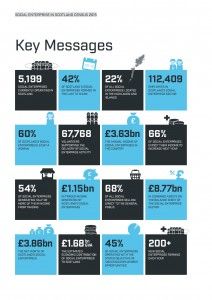As a social enterprise itself, SURF is all too aware that the size, scale and diversity of Scotland’s social enterprise sector can be underplayed and underappreciated. Here, Duncan Thorp provides an overview of the contribution of the sector to our economy and society, its place in the changing policy context, and what umbrella body Social Enterprise Scotland will be working on in the run-up to the 2016 Scottish Parliament elections.
The recent Social Enterprise in Scotland: Census 2015 research has revealed some impressive results about the size and economic impact of Scotland’s social enterprise community.
We can now see, for the very first time, that there are well over 5000 social enterprises across urban and rural Scotland, with 200 new social enterprises being formed each year. The Highlands and Islands has 22% of all social enterprises, with Edinburgh and Glasgow collectively accounting for 26%.
Economic and Social Value
Scottish social enterprises provide over 112,400 jobs, with £1.15bn in combined traded income, net collective assets of £3.86bn and a Gross Value Added figure of approx. £1.7bn. In addition a huge 60% of social enterprises have a woman as their most senior employee and 68% of social enterprises pay at least the recognised, authentic Living Wage.
These are some impressive statistics and demonstrate a business community that compares well with other parts of the economy. In fact our social enterprises collectively employ around the same number as Scotland’s food and drink sector, more than the energy or creative industries sectors and well over half the numbers working in our financial sector. 45% of social enterprises are also operating with the specific intention of “creating employment opportunities” and 75% employ more than half their workforce locally.
The policy context in which social enterprises have been operating in for the past few years has often been a favourable one. The Scottish Government has invested in social enterprise development with tailored business support through Just Enterprise and investment with the Enterprise Ready Fund plus other funding streams. Support for social enterprise cuts right across political party boundaries too. With a tough business and competitive edge, a charitable heart, local community roots, and a clear remit to improve lives, there’s something that everyone can support. We’ve found an open door within all Holyrood political parties and their support is appreciated by our business community.
 In addition, local authorities have some specialist advisors within their Business Gateway services and local Third Sector Interfaces have a remit to support social enterprise. Many are supported through Highlands & Islands Enterprise (which has a specific remit) and also Scottish Enterprise, including via Co-operative Development Scotland.
In addition, local authorities have some specialist advisors within their Business Gateway services and local Third Sector Interfaces have a remit to support social enterprise. Many are supported through Highlands & Islands Enterprise (which has a specific remit) and also Scottish Enterprise, including via Co-operative Development Scotland.
Growing Influence
Barriers to social enterprise development do, however, still exist at a local level, where there can sometimes be a resistance to change or to do things differently, or a reluctance by local organisations to include social enterprises in decision-making and in the allocation of funding. Of course, things have improved with the specialist social enterprise procurement service Ready for Business and other developments like Public-Social Partnerships. Public service redesign and reform need more social enterprise solutions.

Social enterprises such as employability initiative WorkingRite have been highlighted in the SURF Awards
In terms of recent legislation, the Community Empowerment Act and the Procurement Reform Act are having a direct impact on many (but not all) social enterprises and open up new opportunities to do things differently. There are many parts of the jigsaw that make up the broad social enterprise movement and specific legislation and regulations around housing associations, co-operatives and credit unions, for example, impact on those parts of social enterprise.
Our regular Cross-Party Group on Social Enterprise in The Scottish Parliament is our national policy forum. Past meetings have discussed the role of local government in developing and supporting social enterprise, new powers for Scotland and the Smith Commission and welfare reform, among many other topics. The annual Social Enterprise Awards is held in The Scottish Parliament, where MSPs can network with social entrepreneurs and we send out versions of The Social Enterprise Monthly emails to a huge range of people across Scotland, including all local and national media, the public, MSPs, MPs and MEPs and their staff, local elected members and local officials, civil servants and private sector partners. Our priority in everything we do is the promotion of social enterprise as an idea and as a better way of doing business, as well as the promotion of individual social enterprise members as real life, inspiring case studies.

We also responded to the Smith Commission and called for strong new powers to benefit social enterprise and we produced a manifesto for the recent UK General Election. We always ask social enterprises directly what they want us to campaign on and what policies we should be promoting to benefit their growth and development.
For our 2016 Scottish Election manifesto we’ll again be asking our members – and indeed all Scottish social enterprises – what policy changes they want to see the next Scottish Government deliver. A consultation will be released soon so keep an eye out for it, we want to hear your views.

